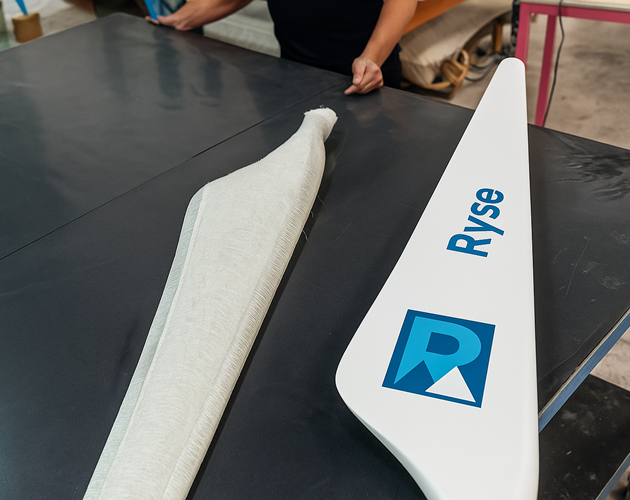

Verretex SA, an EPFL spin-off pioneering regenerated glass-fibre textiles, which raised a total of CHF 150,000 ($US169,705 at the time) in February 2025, and Ryse Energy, a global manufacturer of small wind turbines and hybrid off-grid systems, announced on 2 September that they had successfully completed a pilot study demonstrating that Verretex’s 100% recycled glass-fibre textile could be used as a drop-in replacement for conventional virgin glass-fibre fabrics in the manufacture of wind turbine blades.
The pilot was conducted at Ryse Energy’s Spanish manufacturing facility, led by Neil Baxter, Technical Composite Specialist at Ryse Energy. The trial demonstrated that Verretex’s recycled textile could be processed using Ryse’s existing blade lay-up and curing methods with no tooling or cycle time modifications. The blades produced met Ryse’s rigorous strength and stiffness standards for small wind turbine application, also complying with IEC 61400‑2, the standard for small wind turbine safety and durability.
“We are constantly evaluating ways to reduce our carbon footprint without sacrificing performance,” said Neil Baxter, who spearheaded the pilot in Spain. “Our team was able to integrate Verretex’s recycled textile seamlessly, and the resulting test blades met the strength and durability requirements essential for wind turbine performance. This shows the real-world potential of recycled composites in renewable energy manufacturing.”
“This pilot validates Verretex as a true drop-in solution for blade makers,” said Mitchell Anderson, CEO & Co-founder of Verretex. “We regenerate textiles from end-of-life and production scrap glass fibres to create virgin-like, low-carbon materials that fit existing production, no retraining, no retooling.”
“Circularity without compromise”
A recent Life‑Cycle Assessment (LCA) of glass‑fibre fabrics conducted by Tech-Fab Europe (via PwC) revealed that the production of the glass fibre itself was responsible for 89% of the carbon footprint of the final fabric. Therefore, by avoiding the need to reproduce new glass fibre, Verretex and Ryse’s pilot enables significant carbon savings, especially since Verretex’s recycling process does not require the remelting of glass fibre, which is very energy-intensive.
Verretex is planning to scale its production of recycled glass fibres to meet customer demand and reach competitive costs. Then, Ryse Energy will integrate these circular materials into its global production chain, i.e. its production facilities in Spain, Europe and the US, and move into scaled production on these turbine models.





 Lu public network security: 37140202000173
Lu public network security: 37140202000173



